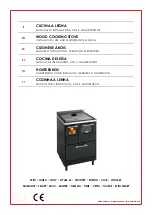
20
Starting and Maintaining a Fire
Burn only solid fuel directly on the bottom of the stove, do not elevate the fire in any way (ie. no
grate is required).
STEP ONE: Mount the Thermometer
Place the magnetic thermometer, on the stovepipe 18-24 inches above the top of the stove. The
reading on this thermometer will be referred to below as the external stack temperature or just the
'stack temperature'. Internal stack temperature should not be confused with external. Typically
the internal stack temperature (ie. if you use a probe-style thermometer) will be double the meas-
urement taken with an external (magnetic) thermometer.
STEP TWO: Prepare the front chamber
If you have an ash-pan, ensure that the ash shaker-grate is fully in (towards the stove) such that
the openings to the ash pan at the bottom of the front chamber are blocked. Also, ensure that the
ash-pan is fully in, sealed tightly to the gasket, and clipped in place. Open the stove lid and
spread out approximately 2” of ash on the floor of the front chamber.
Open the adjustable draft bar until it is fully open. Place 2 or 3 pieces of small dry, split wood hori-
zontally on top of the ash creating one loose row of wood across the bottom. Place plenty of dry
kindling on top of the wood in a criss-cross pattern of layers about 8 inches deep (no higher than
the nuts on the back baffle). Place some cardboard and about 4 pieces of crumpled newspaper
on top of the kindling. Close the lid. The front chamber is now prepared.
STEP THREE: Prepare and light the back chamber
Open one of the side ash clean-out doors and place two or three pieces of crumpled newspaper
into the rear chamber. Light the newspaper and close the ash door. (This step is very important,
as it pre-heats the chimney and starts an upward draft). When the stack temperature reaches at
least 100 F, you are ready to light the front chamber.
STEP FOUR: Light the front chamber
Have your hoe-poker easily at hand. Raise the stove lid. Light the newspaper you placed in the
front chamber. Stand your poker on the floor in front of the stove and turn the handle inward to-
wards the stove. Bring the lid down gently resting it on the poker. (The poker has been perfectly
sized to keep the lid propped open to create an air gap during start-up.)
Always stay near your stove when you have your lid propped open. Now, watch the stack tem-
perature rise. With proper draft (meaning your chimney height is correct, see section on chim-
neys) you will reach a stack temperature of 550F in about 5 minutes. If it takes longer to reach a
stack temperature of 550F, either you put wet wood on the bottom under the kindling or your draft
is insufficient.
STEP FIVE: Add fuel
When the stack temperature has reached 550F, and has started to fall, it is time to add more fuel.
You can fill the front chamber right to the top as long as the lid will close completely. When re-
loading the stove while it is still hot and a bed of hot embers still exists, follow this reloading pro-
cedure:
Always wear insulated fire-retardant gloves when tending to the stove.
Push the air control lever to the full open position (far right).
Wait a few seconds before opening the lid.
Use a poker to distribute the hot embers equally around the firebox.
Load the fuel, usually with smaller logs first.
Wipe off the ledge to ensure any debris is cleared off to ensure a tight seal.
Close the door. Be sure to latch the door tightly.
Wait 5-10 minutes to ensure the new fuel has fully ignited before adjusting the air to the de-
sired heat setting.















































